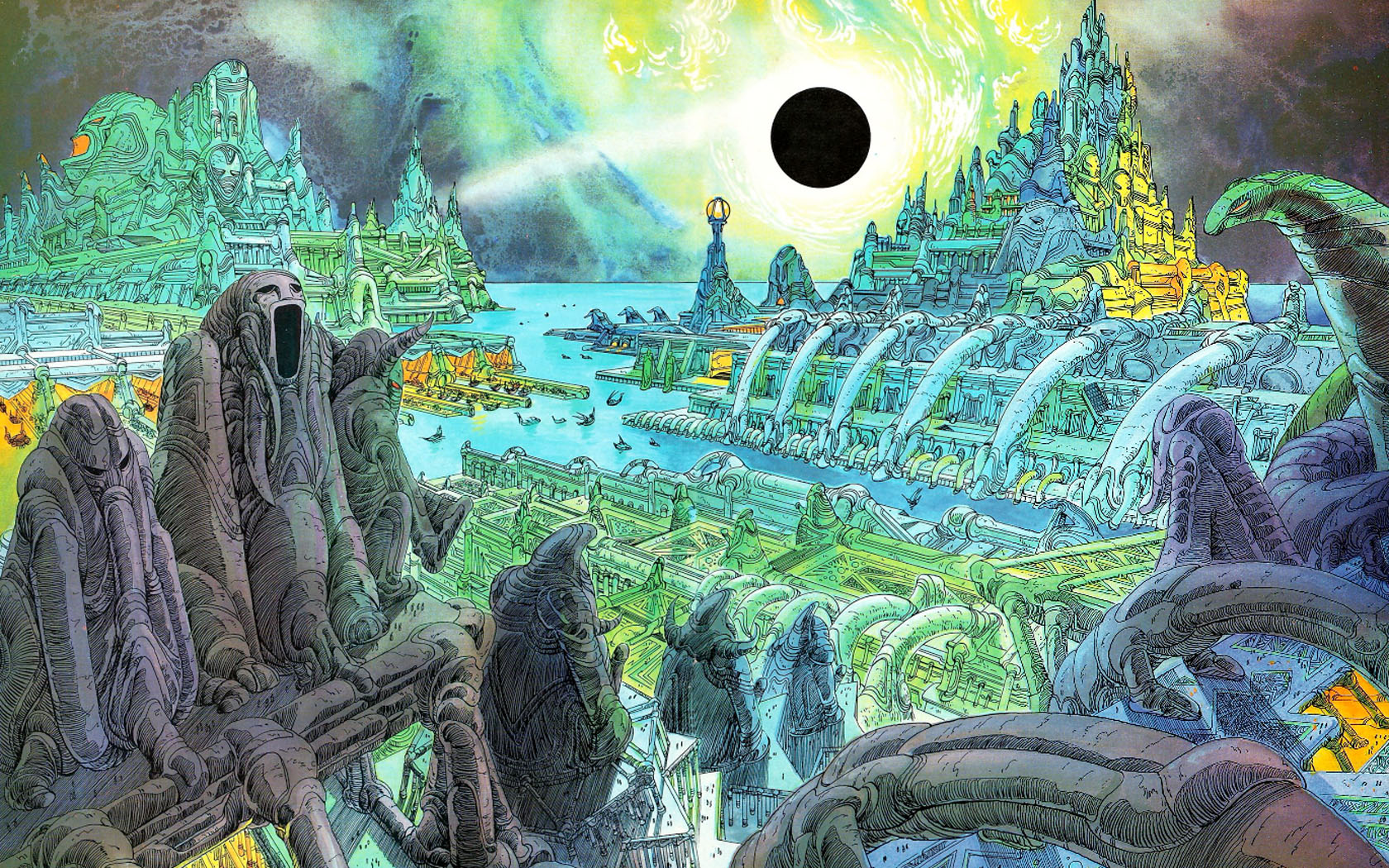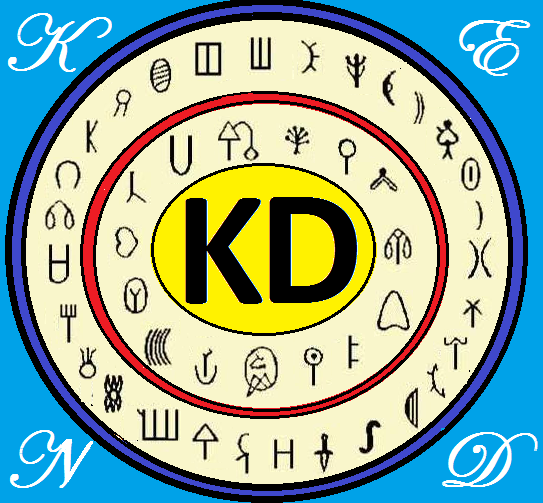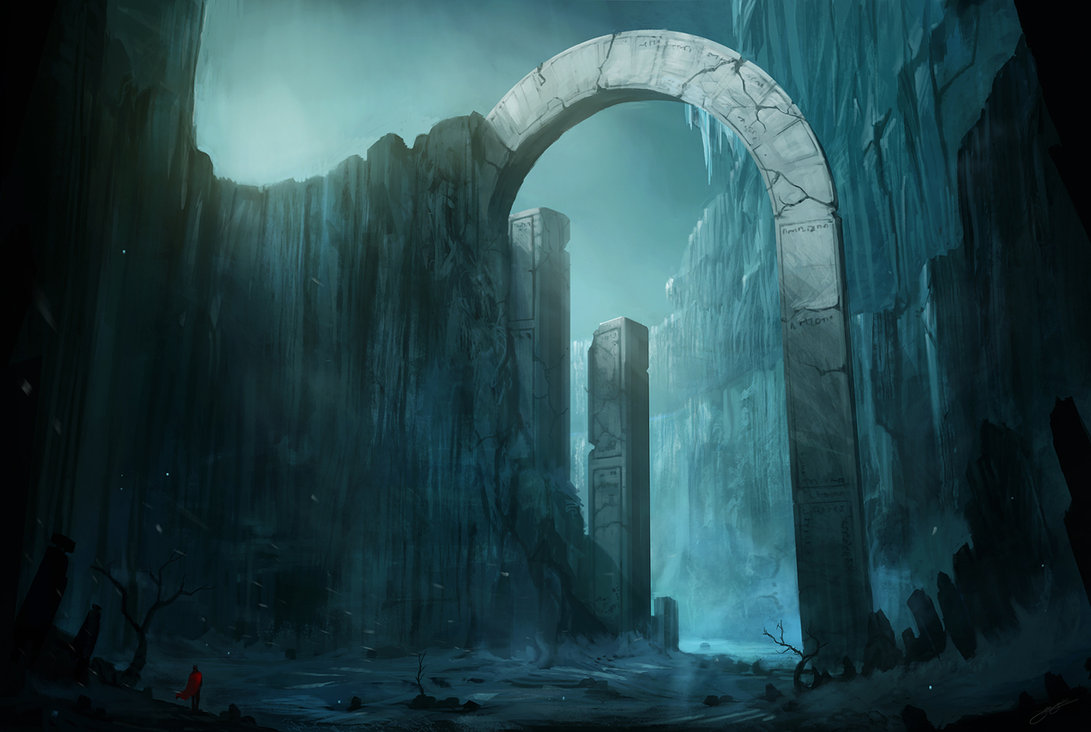Second Telling of the Supplication of Loke
Creation Mythology of Loke
Summary
"The Supplication of Loke" is a creation-myth story about how the world which we live on came into being. The supreme body of Loke is merciful to the other Ishvara, who find themselves swept up in Her embrace. For a time they floated together above the destruction of the universe around them. Five of these kindred spirits built a garden devoted to Her and bore Her gifts to aid Her struggle. After a time, it is clear that work still needs to be done to keep the world afloat. Four more Iṣvara offer their souls to Loke and so make the four great Astras; which determined much of the meta-physics of the universe: gravity, the cycle of reincarnation, day and night, seasons, tides, etc. This also serves to introduce us to ten important Iṣvara and hints at their larger role in the universe. Afterwards the land becomes a veritable paradise, and a nearly immortal peace ensues. If there are tales to tell during this time then none have ever told them. The next important event following this is the so-called The Heavenspear's War. The story is also told from the second-hand perspective of the historical figure The Priestess of Bahamootbali who was shipwrecked on the Island of Jï, the full story of these events is found principally among the much larger body of writings known as The Ahrishastra though the tale has been re-told and re-contextualised as a semi-mythical story in it's own right.Excerpt from the Ahrishastra - Book IV
The Priestess of Bahamūtbali - Part 3
The shipwrecked priestess had sought shelter from the wind and found the alcove. She prayed to Fire for warmth and comfort, and so he came to her then. He performed a miracle for her: The dragon cooked a piece of driftwood into a hearty steak. She ate his food and was no longer shaken with fright. The thunder rolled across the sky, and Ahri let her rest her head in his lap as he told her the story of His Mother's conquest over song and storm:There, do you see Her? All around us. She is Lôkə. The Universe Is Her Body And We Are All Ornaments On Her Infinite Being. I will share with you Her tale. Should you like to hear it, remember it well; for I will not repeat it thrice."The priestess nodded, and the flames flickered and danced before her eyes. She saw in them a vision; reflected in his scales. Fire's words mingling with Fire's body to summon the story once again. She felt the heat in his voice, and her worries melted away.
Ahri said:
It is the days before time truly began; The Maw—which has always been there, gulping at all things—is massive enough to finally churn the once-calm seas of Primeval Reality into a Maelstrom of destruction. The void is as water swirls down a bathtub drain; a downward draft that leads only to the total destruction of all things. On the surface, the vortex whips up a Storm of Chaos that washes across the universe, capsizing all bodies and every world. Desperate, as they helplessly drown, two Supreme Bodies—Iṣvara—come together. They embrace a final and infinite embrace. They sing in each other's arms. It is a song that pleas for longevity; a dirge that threatens inevitably; a prayer that sues for peace; a hymn that wants never to end. It is the most beautiful and the most terrifying song ever sung. It resonates in all of their Souls. Their Ātman merges to find balance between bright and dark, life and death, love and hate, land and sky, development and deterioration; an infinite microcosm of all that came before. It happens instantaneously, but lasts an eternity. Lôkə exists now and forever, The Cosmic Mothers Whose Eternal Love Birthed All-Reality. Pregnant with new-found hope; She spreads eighty-two wings of grasping flame and clings onto the firmament itself. Her scales grow into spines that tear at the fabric of space; repulsing the figments of chaos. She stretches Her limbs of stone; pillars to hold against all forces. Her hearts are furnaces; ever-replenishing the metals in Her veins to withstand the pain and pressure. She is molten refusal incarnate. Now She waits like a net to catch any surviving Kin. Her mercy brings them refuge, and they scramble into to Her warm embrace; as you do to I, priestess. She Is The Shelter Against The Storm. She cries with joy, for they are safe; and her tears become the seas. The world as you know it is not yet formed though. Her position is still precarious. She is a spinning bridge across the endless decent; chaos above and darkness below. Either would happily slay Her. Lôkə pulls with all Her might, but Her sanctuary is threatened. She sends Aspects of Her being—my brothers and I, our nagas, and their ilk—to fight on Her surface:Ahri conjured visions of the battles as he remembered them in the flames. Horrifying figures manifested through the stormfront; some were of flesh and blood and bone, but it was clear that they were not truely of these things; some had faces, they copied the strides of men and beast; others were lotus flowers of impossible geometry; some could not be seen, but the priestess knew they were there. Outsiders all of them; intercessions of chaos. The battlefield was like the stars seen through colourful smoke.
The dragon continued his telling:
Seeing Her strain, some of Her Kin—Iṣvara She'd saved, each a Supreme Body in their own right—put aside their differences and united to console Her:A spark snapped through the sky, and the priestess huddled closer in anticipation of it's growl.
At Her navel, Whose Roots Held Onto Firmament grows to cover Her body in colours beyond your vision and dresses Her in patterns you can no longer imagine; the hues would blind you as they blinded her enemies. The shapes and garments ward Her against discord; your modern fashions are a replication of Lészi's first tool.
Around Her waist, Written In Many-Fork’d Lightnings wrap Her in a sash of holy wind; which buffets against all external forces. Its wings defend Hers; they snap at any who chew at Her grip, and growl to keep them at bay. The thunder that boils above us here, priestess, is but an echo of Alígra's first edict; the war-cries of your people are no different.
Her legs are bathed by The Tacit Abyss Unfathomed, whose waters bring a sweetness to Her scent; which beings from Beyond find intolerable. This is why you must keep yourself clean, priestess; brew perfumes in honour of Facdŵr's first caress.
In her stomach, Seven Hearts Of Frightening Delights cooks for Lôkə delicacies of such complexity and beauty that Her breasts produce milk of white hot flames that warm her body and kill her infections. That heat makes the world hospitable to you, even in this storm, and so you should give thanks for Cbapór's first meal.
Finally, Her mind is adorned by Tallest Peak Of Unworldly Glory, a crown of all-seeing solace, made of all the worlds most valuable materials; said to reach into the stars. Now She may always see all parts of Herself, know the distance between all things, and feel the resonance of any hidden object. So you see priestess, it is by the crown and by riches that your kings and queens might rule; hewn from Pyatthat's first spine.
Ahri waited for it to pass before he resumed:
The Storm is fought on all fronts. It is a time of lost magics and the greatest of beasts and demons are reared on Lôkə's great pastures to aid in the fight. They are the only beings who can survive in this harsh time. Behemoths of majestic awe. Organisms on the brink of life: The poisonous Zhиnnos with wings that stretch between valleys; The snapping Rupert with a shell the size of a city and jaws that chew steel; The many-headed Tlawer who gulps up sea-water and spits blades of salt; The tall-king Mahiṣa who brandishes a mountain; Pycnevitarse the stilt-legged impaler that stalks the ocean ridges; And the five-spoked eye in the clouds, Juxil'ntu, whose existence offends all things; These are but a few of those forgotten Titans. Still, Lôkə is a molten ball of all matter. Her lands as you know them have not taken form. And no place is stable for long. As many die in the churning of Her gizzard as do against the Storm. Gaur and many Iṣvara find this environment discomfortable; moreover, The Horned Rainbow Lords see that Lôkə’s grip wanes against the weight of the chaos. They seeks Her in the veins of the earth; where She meditates upon Her beating hearts. Twelve-Faceted Ivory Monastery says:Ahri tells her that this is why ripe fruit will fall from a tree. He explains that it is the world lifting up to catch it; an effect of The Spear which is now buried at the heart of the world.
“O Lôkə, Thou art greatest among us; but even with our gifts and our aid Thine boughs art sinking still. See, O finest Queen of Queens, how the weight of this war takes a toll on us all? We may yet fall, and all will be for naught. Allow me to ease Thine muscles; take my Wings, O Orgy Of Elemental Fury, and let them carry us against all forces: Craft from them an arrow of defiance against this cruel madness: Let it point’th Thou in the direction of triumph over the impossible.” So Lôkə reaches into Gaur’s Soul and pulls from them the Spear Of Ambrosia and hangs it from the sky. In that instant; the forces that pull us towards the ground were established.
Then he said:
With the land flattening beneath The Spear, the Iṣvara begin to prosper. They make life more delicate and specialised to fight against the nuances of The Storm; beings made in their own image, coalesced from the precipitation of All That Came Before. The wars are longer and more bloody than any that have ever been fought since. The Iṣvara send their Titans and their Māyā—elemental aspects, shard-souls, soldiers, and lesser creations—into the frey. Some compete with inexorable prowess others are abject failures, but each death is true, and they sap the strength of their progenitors. The Iṣvara known as Sānaloé, Argent Madness In Heavens Burning, notices this pattern and realises that such wasteful behaviour will lead to an expedited destruction. The Virtuous Midnight-Essences travel to Lôkə—who bathes in the frostbitten clouds; pondering Her existence—and beseeches Her:The dragon Ahri explains to the priestess that this is not quite the same as the cycle of reincarnation that is known today—though they are related. The Heavenspear's War is a story for another time, however.
“O wise and graceful Lôkə, hear our plea. We foresee a grave destiny awaits this world and its inhabitants; they are all dying, and we kill ourselves with them. We walk on a road to a slow and wasteful end. Let us stop and take another route. O Mothers Of All, take our Breath and weave it unto itself: Draw from it a thread to bind all the shattered souls in this world to Thine corpus: Make it a cycle of life and rebirth: An engine of infinite resurrection.” She does so. And a part of Sānaloé’s Soul is spun into the Great Wandering Wheel. Their sacrifice brings an end to all suffering in the world—for the only true pain is death—and this is now overcome.
Fire continued his telling:
Still the battles rage on, and so The Maw widens in response. It gobbles up the debris of war, growing larger still. It pulls on Lôkə's divine being in every direction. The Iṣvara called Faræ, Sejant King of Holiest Light, sees how She is drawn taut like hot leather. The Pride Of The Electrum Desert prowls through the forests to find Her palace of tall trees; where She studies all words that have yet to be written. The Highest Plains Of Vaporous Gold says:Ahri told the priestess that once The Cosmic Mothers was satisfied She set it on a rotational course around Her being. Each cycle takes twenty hours; but when the strain is great The Sun will stay below for longer—at other times The Maw is weakened and The Sun may rejoice above earth—hence we have the seasons. Politely, the priestess asks Fire about Tenebrosity; though she thinks she already knows the answer. Ahri explains that The Maw is like a caged beast that always seeks escape, and that Tenebrosities are times when The Sun must wrangle with its ancient nemesis; disappearing from earth for indeterminate periods.
“O Turquoise Poet Of The Fertile Thought, I believe that Thee require our aid. This war spreads dark clouds across the universe and the eye of oblivion is dilated. Wilt thou not become exhausted by the constant strain? Please, O Goddess Of Our World take my Nerves and let them light up this world: Compress them to a ball of golden flame and hang it in the clouds: Make it an object of such inexorable brightness that it cauterizes The Maw: A light by which all may see in Thine beauty, Mistress, and so praise You with admiration and awe.” And thus Lôkə stands from Her desk and sighs hot smoke into the forest. It alights and begins to burn. In the heat She smelts Faræ’s Soul and forges the ingot into The Sun. She first positions it beneath Herself, to be immediately relieved as The Maw squints with fear and confusion. Then She raises it up and as the first dawn rises a green-gold elation spreads across Her form.
The priestess nods in understanding and the dragon speaks again:
But the world is not yet sated. The Iṣvara bear witness to one final austerity. The daily motion of The Maelstrom now sends ripples into The Storm, which percuss into a great wave. In the new light of The Sun they can see the tsunami as it rolls across the universe, threatening to flood everything once again. Shepard Of Glaciers, the Iṣvara Latvnh infers what must be done to stop it. The Bodhisattva Who Lays Before Evening Dew, hastens to meet with Lôkə—who ebbs along the coral plateaus; singing all songs never sung—and prays to Her:Ahri stared at the priestess for a long time then, contemplating something, it seemed. It was certainly late, and she looked tired. The dragon of flame, who took then the shape of a man, performed a second miracle for her: He plucked a rock from the cliffside and cut his thumb with it’s sharp edge. He squeezed a drop of his blood into the embers before them, and a plume of smoke re-shaped the alcove into a dome-roofed hut draped in comfortable yellow silks.
“O Empyrean Throne Of Verdant Dragons, wherefore art Thou dormant in this time of tumult? Dost Thou not see that the chaos from Beyond will wash all that we have built away? O great Lôkə, we beg Thee, take our Heart if Thy would have need of it. Arm Thyself against The Storm: Use it both to shield us from that most monstrous of waves, and to strike at the source of all anarchy: Take it O Goddess! It is time to end this primordial struggle. Let our victory not be pyrrhic.” Lôkə nods slowly and knowingly. She sees the passion in Latvnh’s words and takes her in an embrace; drinking a measure of her Soul. Then She stretches it into a pale-chromatic discus—The Moon—and hurls it into the sky. It smites not just the wave in The Storm, but all waves—and they shudder in it’s presence to this day—bringing the tides. Lôkə recalls the weapon, and hangs it in the sky: a warden against all future threats, patrolling the universe. It’s iridescent light is an illusory thing, priestess, but it shields your mind from the reality of The Storm Beyond The Veil. From time to time, The Moon must move to cleave at the greater threats, and that is when the smaller ones leak through. Therefore, priestess, you must always be vigilant on moonless nights like these: Your dreams are always the most vulnerable in the darkness.
He told the priestess that he must leave soon, but not before finishing his story:
The Storm takes recess, and The Maw—which has now consumed much of the infinite expanse—is satiated. Lôkə is like a great vivarium, and the Iṣvara take time to cultivate life in their image: Lészi’s beautiful plants decorate Her body; Alígra’s hidden beings reverberate with delightful taste and music; Facdŵr’s colourful fish swim happily in the streams and oceans; Cbapór’s mischievous creatures explore undergrowths and caves; and some of Pyatthat's clever primates and rodents tell stories and build great monuments. Lôkə Herself is the progenitor of all lizards, drakes, and birds—and they spread across Her form and find homes in every corner of the world—while Her nagas protect Her body and guard Her spirit. And of the four who made great sacrifices to Her? Gaur's Spear, Sānaloé’s Moon, Faræ's Sun, Lathvnh's Wheel were each divinely protected, given duty and meaning, and revelries and festivals are still held in their honor to this day. These are the Great Astras that protect all life on this world, child. They are the empyrean quartette, highest of all gods. Even Lôkə pays them respect, for it is well-earned. For the Iṣvara and their great souls—all in that Garden of Paradise—a thousand-thousand years of perfection and prosperity ensues. But that was a bygone time. Much has changed since then… Sleep now child. Let the warmth of Her embrace protect thine being priestess, but guard thine dreams well.In the morning when the priestess awoke, the flames had smouldered and died, and the Fire too was gone. The priestess did not forget the events of the evening however. And she found that Ahri had performed one last miracle for her: her once-ruined clothes and bow hung upon the mangrove roots, fresh and clean and mended; the bowstring had been replaced with a special red-tinged twine, and she found that any time she used it to hunt for food, it would always strike swift and true.
The priestess continued her pilgrimage then(...)"
Historical Basis
Spread
Variations & Mutation
Cultural Reception
Remove these ads. Join the Worldbuilders Guild












This is a really great creation story. I'll have to come back to it to read again for better understanding and inspiration for how dragons are treated in my world. I will say it was difficult to understand in the beginning, but I believe it was because I had no idea what I was reading and there were a lot of names that my brain was trying to sort through. I wish you could move the summary above to tell the reader what they are reading. Maybe instead, you could put in small text at the top of the article to direct towards the summary below first.
Thanks for the feedback and the follow! I've moved the summary to the top now. If you end up reading the rest let me know what you think. Don't worry too much about all the names and titles, I'm trying to emulate the some of the 'literal translation' styles that certain real-world mythological and religious texts are written in. They like giving each other lots of long fancy titles too.
That's cool that you are trying to emulate it and it makes sense why it's like that. I did read through the whole thing, but I will be coming back to read it again.